- Home
- Peter Ackroyd
Alfred Hitchcock
Alfred Hitchcock Read online
Also by Peter Ackroyd
FICTION
The Great Fire of London
The Last Testament of Oscar Wilde
Hawksmoor
Chatterton
First Light
English Music
The House of Doctor Dee
Dan Leno and the Limehouse Golem
Milton in America
The Plato Papers
The Clerkenwell Tales
The Lambs of London
The Fall of Troy
The Casebook of Victor Frankenstein
Three Brothers
NONFICTION
Dressing Up: Transvestism and Drag: The History of an Obsession
London: The Biography
Albion: The Origins of the English Imagination
Venice: Pure City
London Under
BIOGRAPHY
Ezra Pound and His World
T. S. Eliot
Dickens
Blake
The Life of Thomas More
Shakespeare: The Biography
Charlie Chaplin: A Brief Life
ACKROYD’S BRIEF LIVES
Chaucer
J. M. W. Turner
Newton
Poe: A Life Cut Short
Wilkie Collins
POETRY
Ouch!
The Diversions of Purley and Other Poems
CRITICISM
Notes for a New Culture
The Collection: Journalism, Reviews, Essays, Short Stories, Lectures edited by Thomas Wright
Copyright © 2015 by Peter Ackroyd
All rights reserved. Published in the United States by Nan A. Talese / Doubleday, a division of Penguin Random House LLC, New York. Originally published in hardcover in Great Britain by Chatto & Windus, an imprint of Vintage Publishing, a division of Penguin Random House Ltd., London, in 2015.
www.nanatalese.com
DOUBLEDAY is a registered trademark of Penguin Random House LLC. Nan A. Talese and the colophon are trademarks of Penguin Random House LLC.
Cover design by Michael Windsor
Cover image: Alfred Hitchcock, 1963. Ullstein Bild/Getty Images
Library of Congress Cataloging-in-Publication Data
Names: Ackroyd, Peter, 1949– author.
Title: Alfred Hitchcock : a brief life / Peter Ackroyd.
Description: First United States edition.
New York : Nan A. Talese Doubleday, 2016.
Identifiers: LCCN 2016021521 (print)—LCCN 2016023999 (ebook)
ISBN 9780385537414 (hardcover)—ISBN 9780385537421 (ebook)
Subjects: LCSH: Hitchcock, Alfred, 1899–1980.
Motion picture producers and directors—Great Britain—Biography.
Motion pictures—Production and direction—Anecdotes.
Classification: LCC PN1998.3.H58 A675 2016 (print)—LCC PN1998.3.H58 (ebook)—DDC 791.4302/33092 [B]—dc23
LC record available at https://lccn.loc.gov/2016021521
Ebook ISBN 9780385537421
v4.1
ep
Contents
Cover
Also by Peter Ackroyd
Title Page
Copyright
Chapter 1: The Child Who Never Cried
Chapter 2: I’ll Do It
Chapter 3: Sound, Please
Chapter 4: I Was Grey
Chapter 5: At Home
Chapter 6: Fake It
Chapter 7: Oh Dear
Chapter 8: I Am Typed
Chapter 9: Good Evening
Chapter 10: Birds and Beasts
Chapter 11: Back to Basics
Bibliography
A Note About the Author
1
THE CHILD WHO NEVER CRIED
Alfred Hitchcock was born on 13 August 1899 on the floor above his father’s shop at 517 High Road, Leytonstone; Leytonstone was by the time of his birth a soft forgetful suburb, sweltering in summer and sullen in winter. It was marked by a sense of vacancy, deriving from the time when it was simply a hamlet on the Roman road to London. It was situated five miles to the northeast of the city, and at the time of Hitchcock’s birth was still nominally part of Essex, but the vast roar of London was coming ever closer. In 1856 the Great Eastern Railway arrived and Leytonstone soon became a “dormitory town” filled with the modestly affluent who made their way each morning into the City and its environs.
William Hitchcock was a greengrocer, selling everything from cabbages to turnips. It was as busy as any other high road, with horses and carts and carriages passing incessantly; the scent of bananas ripening, and the musty dusty odour of potatoes, were mingled with the keener stench of horse dung. The pervasive smell of manure was in fact only alleviated by the arrival of the electric tram in 1906, an event that Hitchcock vividly remembered. A photograph was taken of him and his father outside the family business on what looks to be the recently established Empire Day; he is astride a horse, no doubt the one that brought the produce from Covent Garden market. William Hitchcock was a successful merchant, whose business soon expanded, and Hitchcock told one biographer that “I remember my father going to work in a dark suit with a very white starched shirt and a dark tie.” In this, at least, the son came to resemble the father. William Hitchcock was also a highly nervous man, who suffered from various neuralgic conditions such as skin lesions.
Emma Hitchcock was by all accounts also smartly dressed, meticulous and dignified; like most lower-middle-class housewives, Hitchcock’s mother took great delight in cleaning and polishing the appurtenances of the home. She was also adept at preparing family meals, a process she immensely enjoyed.
Hitchcock claimed he was told that, as a baby and small child, he never cried. Yet he also adverted to his terror when, as an infant in the cradle, a female relative put her face too close to his own and uttered baby noises. He also remarked that when a baby is about three months of age, the mother will try and scare it; it is an experience that supposedly both of them enjoy. On another occasion he recalled his mother saying “Boo!” at him when he was six months old. Even if he never cried, he was not devoid of fear.
He had an older brother, called William after his father, and an older sister, Ellen, known as “Nellie”; but they seem to have left no lasting impression on his life. The Hitchcocks were a deeply Catholic family, with three of his grandparents Irish Catholics amongst whom religion was instinctive and almost primordial. His father called him “my lamb without a spot,” and Hitchcock himself remembered standing at the foot of his mother’s bed at the end of the day to recite his adventures or misadventures; it was a form of familial confession.
The family moved down to Limehouse when Hitchcock was six or seven. Limehouse had become an integral aspect of the East End of London by the latter part of the seventeenth century, when it harboured a population of some 7,000 with close connections to the river. These were the men and boys who went down to the sea in ships. In the eighteenth and nineteenth centuries it was one of the most important centres for shipbuilding in London. So now the boy can truly be claimed as a Londoner and even, by the common consent of the time, a cockney. A Chinese colony had moved into Limehouse twenty years before his own arrival, and provided another distinctive colour in Hitchcock’s boyhood world.
William Hitchcock had expanded his business by purchasing two fishmonger shops in the aptly named Salmon Lane; the family lived above one of them, at number 175. The lane was a few yards north of Limehouse Basin and the Thames, so the penetrating smell of fish was compounded by the more settled odour of the murky river. In 1905, just before the Hitchcock family’s arrival in the neighbourhood, Henry James wrote in English Hours that by the Thames a “damp-looking dirty blackness is the universal tone. The river
is almost black, and is covered with black barges; above the black house-tops, from among the far-stretching docks and basins, rises a dusky wilderness of masts.”
Limehouse was a rough and raucous neighbourhood, the very essence of what was known as “the stinking pile” of East London. The river Lea, which runs through it, had for centuries been the site of industries banished to the outskirts of the city, among them dye works and chemical works and glue factories. In an essay that the young Hitchcock devoured, “On Murder Considered as One of the Fine Arts,” Thomas De Quincey described the area in 1812 as “a most dangerous quarter,” a “perilous region” replete with “manifold ruffianism.” It had not changed a great deal by the time of Hitchcock’s arrival. It was a neighbourhood of small shops and houses standing a few feet back from the pavement, little plots of impoverished humanity. Most Londoners shunned the area. When Hitchcock was growing up here the public houses were open from early morning to half-past midnight, with a glass of gin or a half-pint of beer for a penny.
Hitchcock rarely alluded to this fusty frantic world in interviews, but it is manifest in his early English films where the street life of London emerges on to the screen with its music halls and its public houses, its picture palaces and its street markets, populated by the animated and quick-witted cockneys whom he knew so well.
As a boy he was called by his parents “Alfie” or “Fred” which, as soon as he reached mature years, he changed to “Hitch.” He was always reticent about his childhood, and his family, but he did manage to recall certain episodes. He enjoyed telling of the occasion when, for a minor misdemeanour, his father colluded with a local policeman to have him locked in a police cell for two or three minutes. The boy had returned late after one of his expeditions through London. The event is meant to “explain” his apparent lifelong fear of policemen as well as his obsessive interest in guilt and punishment. It is not at all clear, however, why William Hitchcock would arrange for his “lamb without a spot” to undergo what would be for a small boy a terrifying ordeal. One caveat may be entered. Throughout his films vertical bars, parallel bars, and dark slashes of shadow become a familiar motif.
It is clear enough, however, that fear fell upon him in early life. He may have created the little symbolic drama of the father and the policeman, endlessly repeated to interviewers, as a litany to dispel darkness. Yet something already marked him out as a shuddering, shivering human being, afraid of judgement and punishment. Many interpretations and explanations for this have been adduced, from his relationship with his mother (never mentioned by him) to his Jesuitical education (always introduced by him). The sexual fantasies of his adult life were lavish and peculiar and, from the evidence of his films, he enjoyed devising the rape and murder of women. He said that he always followed the advice of the French playwright Victorien Sardou, to “torture the women!” So it is possible that even as a child he harboured desires and instincts that could not be admitted. Hence the fear of the world that became his familiar characteristic. He was afraid of crossing the floor of the studio canteen in case someone approached him. He fled disorder. He arranged his life as if it were a military campaign, although it is not clear who or what the enemy might be.
He had a horror of life that could only be assuaged by his imagination. And, essentially, he never changed. The fears and obsessions of his childhood remained with him until the end of his life. In certain respects, he was always a child. His absorption in the plots of his films, imagining a sequence of powerful scenes, parallels the fantasies of attack and private calamity on which he obsessively dwelled. That, at least, is part of his story.
. . .
From an early age he seems to have been obsessed with travel and transportation; perhaps in fantasy he wanted, somehow, to get away and to be anywhere other than Limehouse, the East End and the riverine world. He collected maps and timetables, tickets and schedules, and all the other paraphernalia of journeying; he pinned a map on his bedroom wall and with small flags charted the progress of ocean-going vessels according to the latest information he had read in Lloyd’s List; he memorised the stations along the routes of the Orient Express and the Trans-Siberian Railway with the help of Cook’s Continental Time Tables. Even by reciting the names of destinations, and contemplating the portions of blue sea upon the map, he was transported in imagination. Yet at the same time he kept a meticulous record of the hours of departure and arrival, so that all his tickets and schedules were arranged in precise fashion. Even as a child he kept tight control over his fantasies. On his office desk, in later life, he kept a European train schedule.
But he was not only an armchair traveller. He said that by the age of eight he had travelled on every route, from beginning to end, of the London General Omnibus Company. Its maps advertised journeys “by motor and horse.” He was a passenger on the London Tilbury and Southend Railway that stretched from Fenchurch Street to Shoeburyness. Here lies the origin of that fascination with boats and trains which begins in his early silent films and continues through Strangers on a Train and beyond. He kept precise timing on his film sets and, as he said in The Stage in 1936, “I have to know where I am going every second of the time.” This is the creed of the nervous traveller.
. . .
His early schooling was that of an orthodox Catholic. At a young age Hitchcock was enrolled as an altar boy, and seems to have enjoyed the ritual that accompanied the office. He loved the sweet sense of guilt relieved, of bells and incense announcing a sacred sense of the world. At the age of nine he attended as a boarder the Salesian College in Surrey Lane, Battersea, over the river; it was established by the order of the Salesians of Don Bosco, with a mission to educate “the children of the urban poor” and “aspiring working class.” Hitchcock lasted only a week, no doubt horrified by the regime of a boarding school and the enforced absence of his family. He was then enrolled at a local convent school on the East India Dock Road, Howrah House, run by the Sisters of the Faithful Companions of Jesus.
At the age of ten he moved to St. Ignatius College in Stamford Hill, a school run by Jesuits in the strict fashion of that order; the motto of Ignatius himself is popularly supposed to be “Give me the boy and I’ll give you the man.” Hitchcock’s pupil number was 343, and in the register of admissions he is named “Alfred Hitchcock, son of William Hitchcock, Fishmonger.”
He told an interviewer that he had learned from the Jesuits the virtues of order, control and precision; the Jesuits were well known for their ability to fabricate arguments on tortuous questions, and for turning equivocation into an art form. This may partly have come from their experience as hunted missionaries in Elizabethan England, when many were tortured in the Salt Tower of the Tower of London before being killed.
Hitchcock absorbed knowledge quickly and expeditiously, so the wide curriculum would not have presented any great difficulty to him. He was obliged to study Latin and mathematics, physics and English; the notable authors, such as Longfellow and Shakespeare, were memorised and recited on special occasions. He never came top of the class, but he usually earned a respectable third or fourth place. He did also gain a distinction in mathematics.
The routine itself was unchanging. The daily Mass was conducted, in Latin, at 8:45, and the boys genuflected to the Blessed Sacrament before making their way to class. Each classroom possessed its own altar dedicated to the Blessed Virgin Mary, in front of whose image were placed flowers and candles. The boys went to confession every Friday where their sins were revealed and absolved. A “retreat” of three days was ordained each year, during which time they meditated on the spiritual exercises of St. Ignatius and contemplated the seven deadly sins and the four last things. In an interview with the school newspaper, many years later, Hitchcock wrote that “a Catholic attitude was indoctrinated into me. After all, I was born a Catholic, I went to a Catholic school and I now have a conscience with lots of trials over belief.” What his training most firmly instilled in him, however, was a sacred rather than a secular vi
ew of the world where mystery and miracle are as important as logic and reason.
Of Irish Catholic stock he was always something of an “outsider,” at least in England. But, more importantly, a Catholic education instilled in him a powerful conscience together with a tremulous sense of guilt. He feared and hated the body. He felt unease with all bodily functions. After he went to the lavatory, he cleaned it so that it seemed as if no one had been there. His was always a life of the mind, isolated and apart.
The priests and brothers of St. Ignatius College also had a predilection for punishment, not unknown in that period in most London schools. It was not quite as hellish as Dotheboys Hall in Nicholas Nickleby, perhaps, but it was tough. Discipline was administered with the aid of a hard rubber strap; three strokes would render the hand numb, so a sentence of twelve strokes had to be extended over two days. In a refinement of anxiety the boys themselves could choose the time for the ordeal; most of them of course put it off to the end of the day, so that their anticipation of pain naturally increased. It is not known how often Hitchcock received this penalty, but it is likely to have been rare. He had a preternatural fear of authority of every kind, and the black-robed Jesuit no doubt instilled nervous terror. He explained once that “I was terrified of the police, of the Jesuit fathers, of physical punishment, of a lot of things. This is the root of my work.” The remark has a further application. He once said that “I spent three years studying with the Jesuits. They used to terrify me to death, with everything, and now I’m getting my own back by terrifying other people.”
His nickname was “Cockie,” and he was not widely popular. He portrayed himself as a lonely boy, without playmates. This is easy to believe. He was plump, and shy, and without physical skills of any kind; he may have exhibited that mild effeminacy that was evident in later life. It is also reported that he smelled of fish, from close proximity to his father’s fishmongery. This is the sort of detail that boys remark. He was not necessarily bullied, but he was known to be odd.

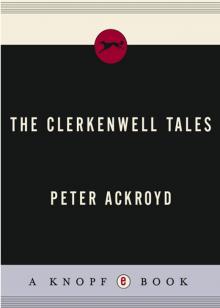 The Clerkenwell Tales
The Clerkenwell Tales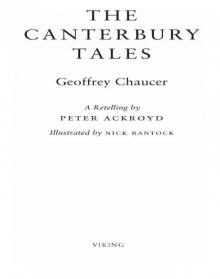 The Canterbury Tales
The Canterbury Tales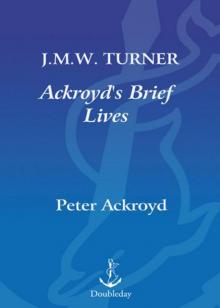 J. M. W. Turner
J. M. W. Turner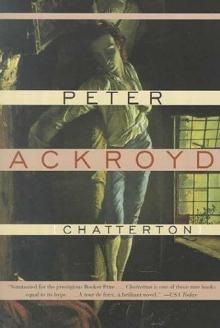 Chatterton
Chatterton The Canterbury Tales – A Retelling
The Canterbury Tales – A Retelling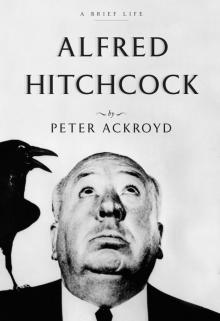 Alfred Hitchcock
Alfred Hitchcock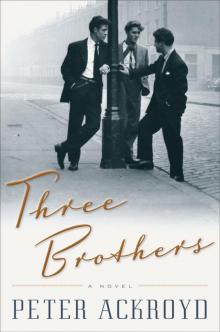 Three Brothers
Three Brothers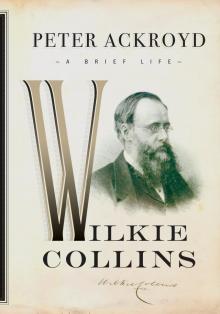 Wilkie Collins
Wilkie Collins Venice
Venice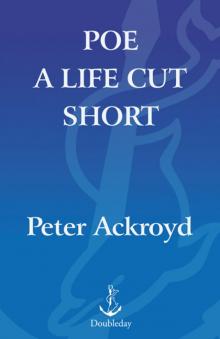 Poe
Poe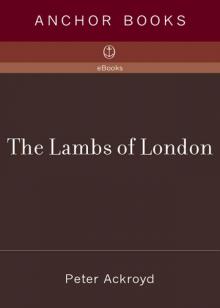 The Lambs of London
The Lambs of London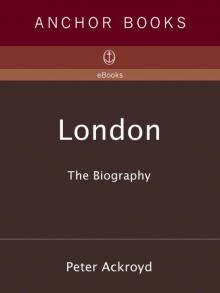 London
London Queer City
Queer City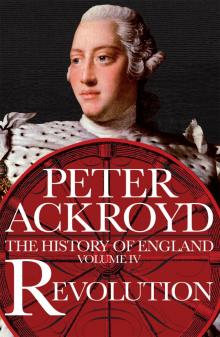 Revolution, a History of England, Volume 4
Revolution, a History of England, Volume 4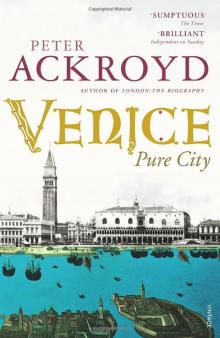 Venice: Pure City
Venice: Pure City Foundation
Foundation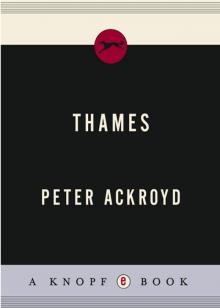 Thames
Thames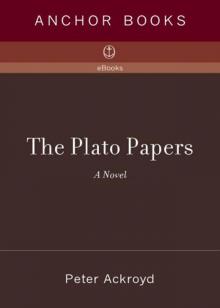 The Plato Papers
The Plato Papers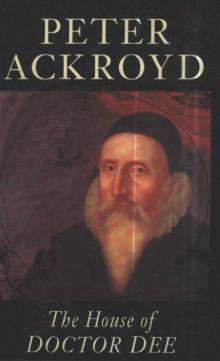 The house of Doctor Dee
The house of Doctor Dee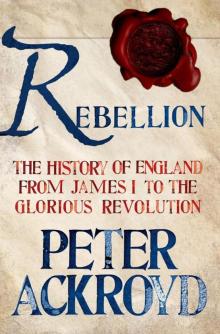 Rebellion: The History of England from James I to the Glorious Revolution
Rebellion: The History of England from James I to the Glorious Revolution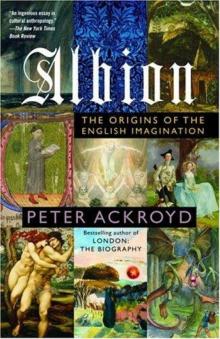 Albion: The Origins of the English Imagination
Albion: The Origins of the English Imagination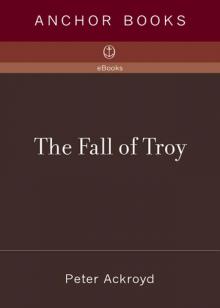 The Fall of Troy
The Fall of Troy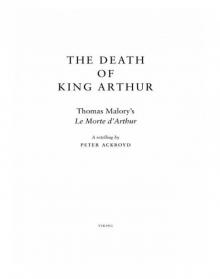 The Death of King Arthur
The Death of King Arthur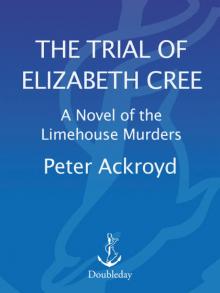 The Trial of Elizabeth Cree
The Trial of Elizabeth Cree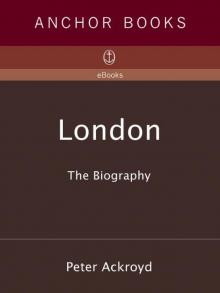 London: The Biography
London: The Biography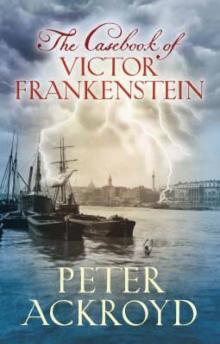 The Casebook of Victor Frankenstein
The Casebook of Victor Frankenstein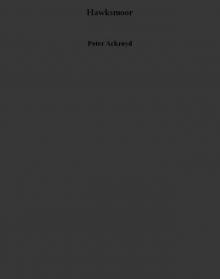 Hawksmoor
Hawksmoor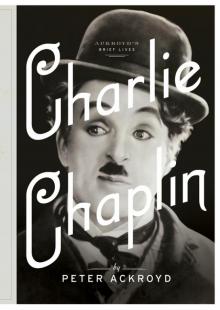 Charlie Chaplin
Charlie Chaplin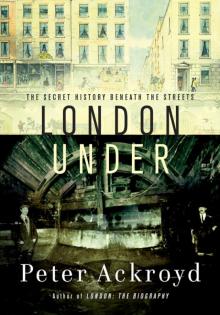 London Under
London Under